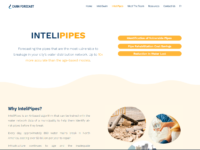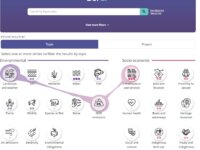Water networks are confronted with aging infrastructure, increased urban population, and climate change. The City of Greater Sudbury has collaborated with CANN Forecast to implement InteliPipes, an AI-based decision-support system that leverages various data sources to improve the overall reliability of its water network. With it the City can (a) understand better the network’s degradation over time, (b) tailor inspection plans and replacement programmes, and (c) optimise watermains…
Case Study Library
Where innovations are collected and shared to disseminate and replicate good ideas

Innovations:
0
This website, as well as any data and map included herein, are without prejudice to the status of or sovereignty over any territory, to the delimitation of international frontiers and boundaries and to the name of any territory, city or area.
Prioritization of projects and initiatives is often challenging and traditionally requires significant investment in administrative time and effort. The Town of Aurora has created a process that automates the prioritization of projects through an algorithm that scores projects based on Service Improvement, Financial Viability, Reputation Improvement and Ease of Implementation.
Governments are buried in hard-to-search PDF documents that hold data with great value for citizens, scientists, and public servants. At the Canada Energy Regulator, we developed data science methods to liberate 20 years – and tens of thousands of kilometres – of environmental and socio-economic data from over 1900 PDF documents from oil and gas pipeline applications. We made it easy to search and explore this data in our powerful and user-friendly search tool, BERDI.
As part of Gov. of Canada ininitiatives to measure regulatory burden, ministries have to report their Administrative Burden Baseline (ABB) a metric calculated using a decision tree based on the text of regulations. This is a long and tedious process that requires combing through regulation and manually parse individual provisions. The Regulatory Evaluation Platform automates that process (it takes seconds v. weeks when done manually) and makes it more timely by allowing for weekly refreshes.
IQed (Inquiries/Questions in education) utilizes cutting-edge Democratic Technology in classrooms for the purpose of empowering students and educators in Digital Literacy, Civic Literacy, Dynamic Engagement, Critical Thinking/Problem-Solving Skills and Global Competency Education. IQed enables every student to use their personal devices to explore, investigate and become informed on issues of governance and global matters, so that their voice can positively impact local and global communities.
Nova Scotia has 21 Community Transportation Operators serving mainly vulnerable populations in rural areas. The CTOs were unable to feasibly procure a common dispatch and scheduling solution that met their needs, leaving them with inefficiencies and inability to meet growing needs. The Outpost for Public Sector Innovation designed a new approach to co-designing and procuring solutions to complex challenges. Together with stakeholders, partners and vendors, two viable solutions were developed.
In 2021 Statistics Canada, Canada’s national statistical agency, successfully implemented a new strategy for coding write-in responses to questions asked on the Census of population. Fasttext, a natural language processing algorithm, was applied to 31 questions and approximately 7 million write-in responses that would have in the past been completed by human coders. This innovation significantly increased the coding efficiency by decreasing the time and cost required to code the 2021 Census.
Impact Canada Challenges have incentivized innovative solutions in the areas of climate action, housing, food, and health. A quasi-experimental impact assessment approach uses tax data (available in most countries) to assess the effectiveness of Challenges by profiling Challenge participants and comparing business performance indicators of Challenge participants vs. non-participants. Requiring only the participant’s business number, this is a no burden, comparative, long-term measurement plan.
A new Area of Management (AoM) on Innovation has been integrated into the Management Accountability Framework (MAF). This is a tool used to promote management excellence in innovation for Canadians by assessing an organization’s ability to plan, generate and use rigorous evidence to inform decision-making on high-impact innovations. This is innovative in that it provides a clear roadmap to building thriving, innovative organizations and outlines a distinct role for executives in the process.
Democratic Technology brings governments and citizens into the 21st century. It empowers engagement in real time on daily issues, between people and politicians in a seamless and transparent way. Using geolocation or an address entry, real verified users are shown their government representatives on their smartphones enabling direct one-to-one messaging on important events. Collected anonymized data enables evidence based decision making for the public and governments.




